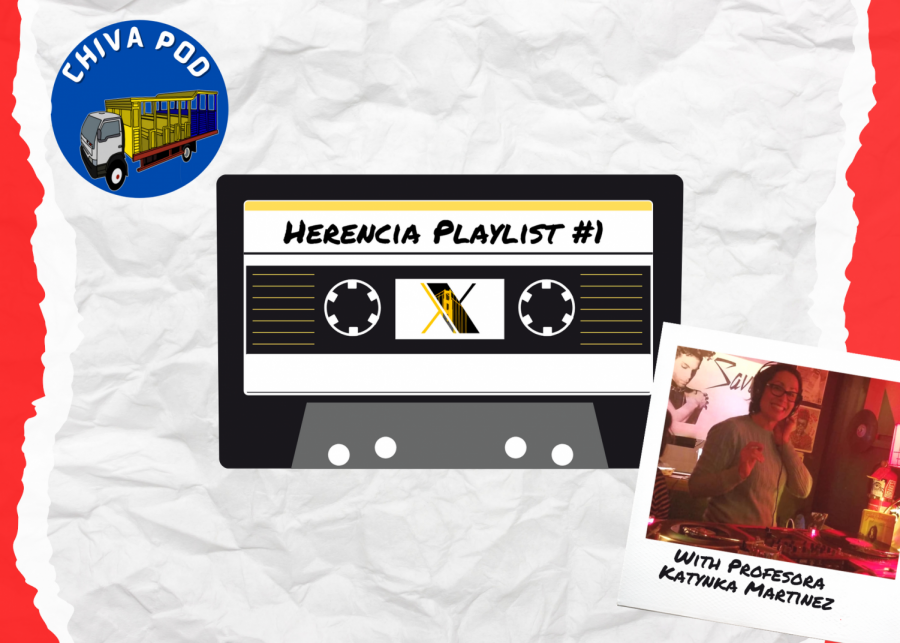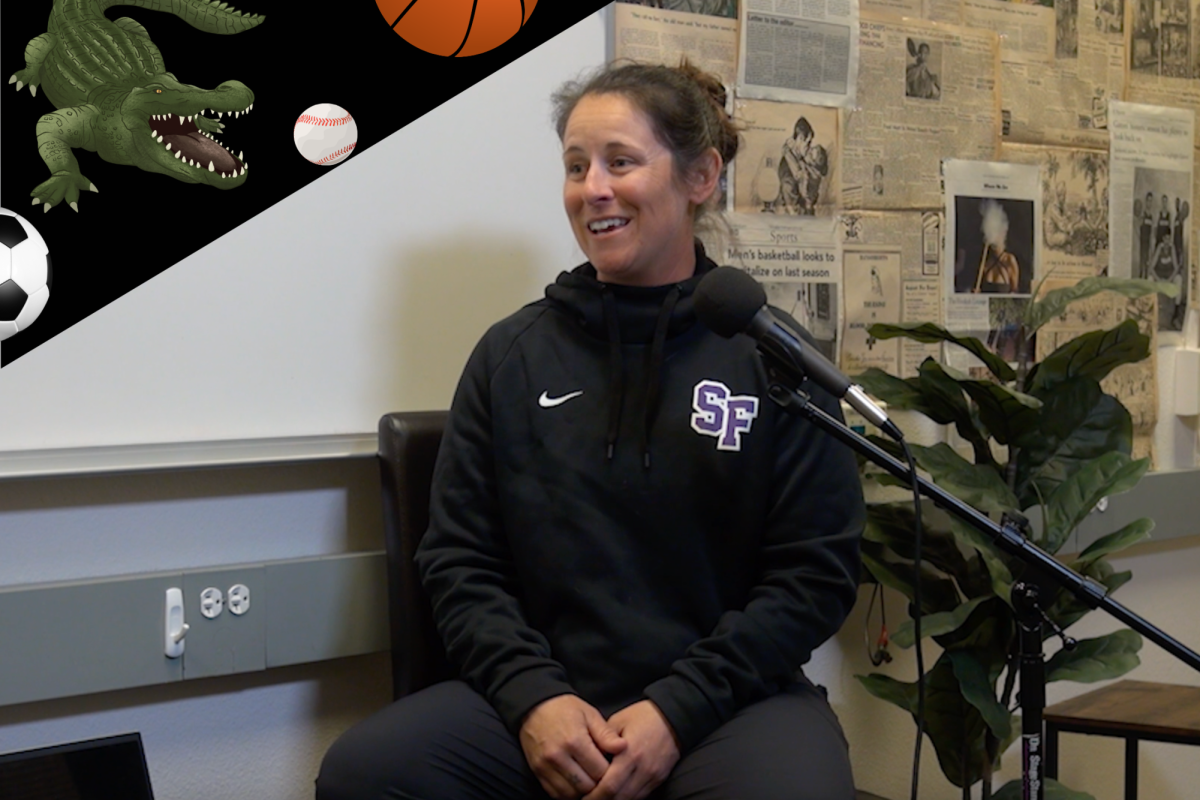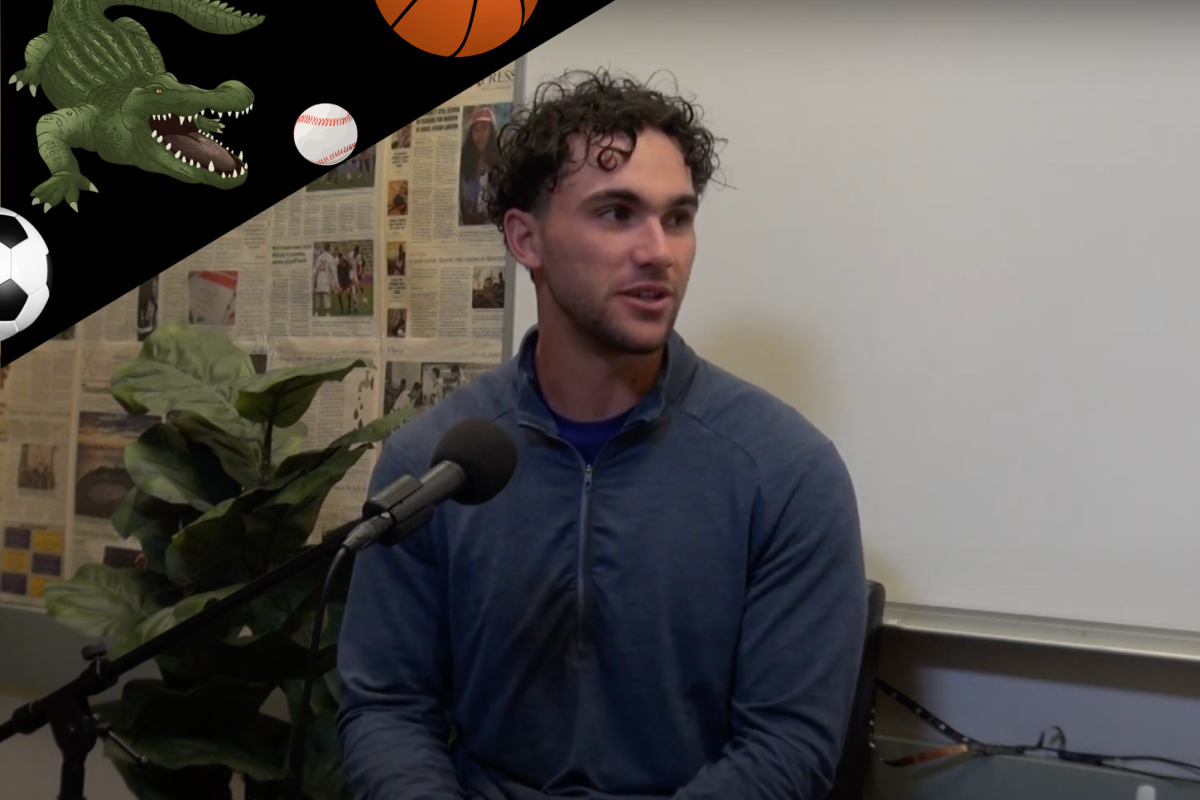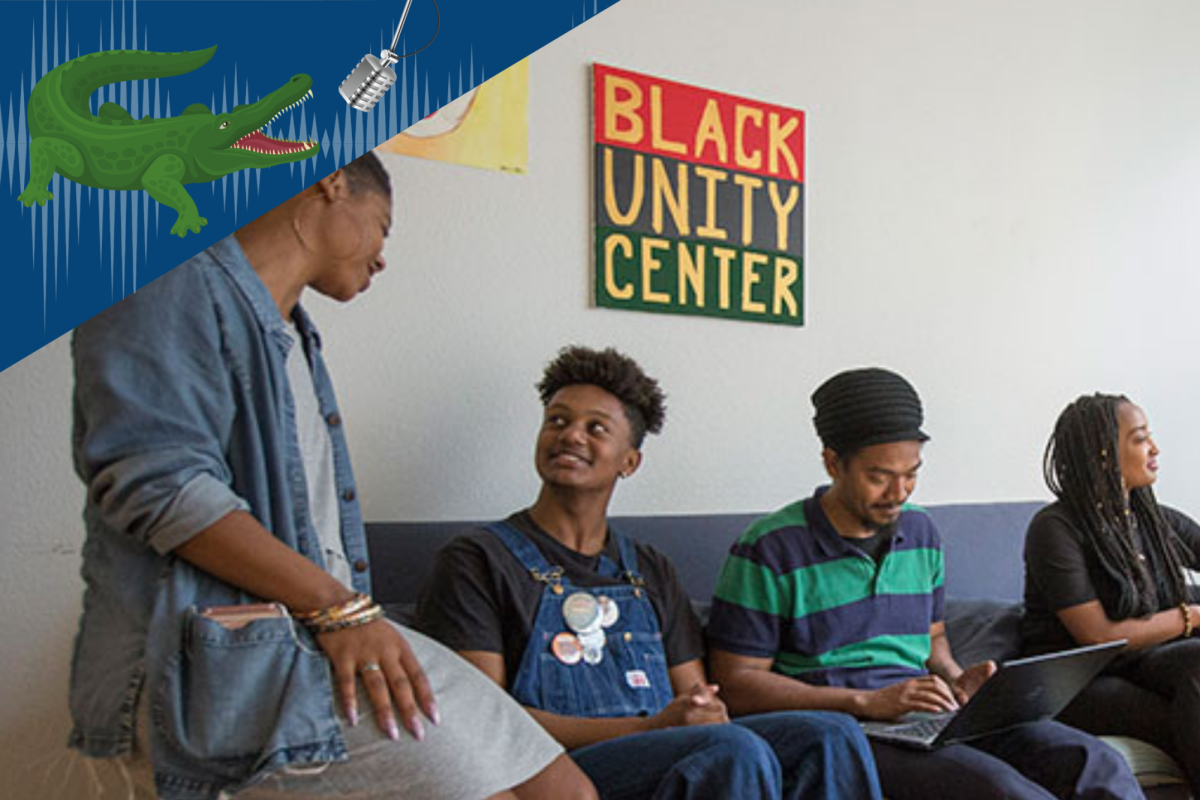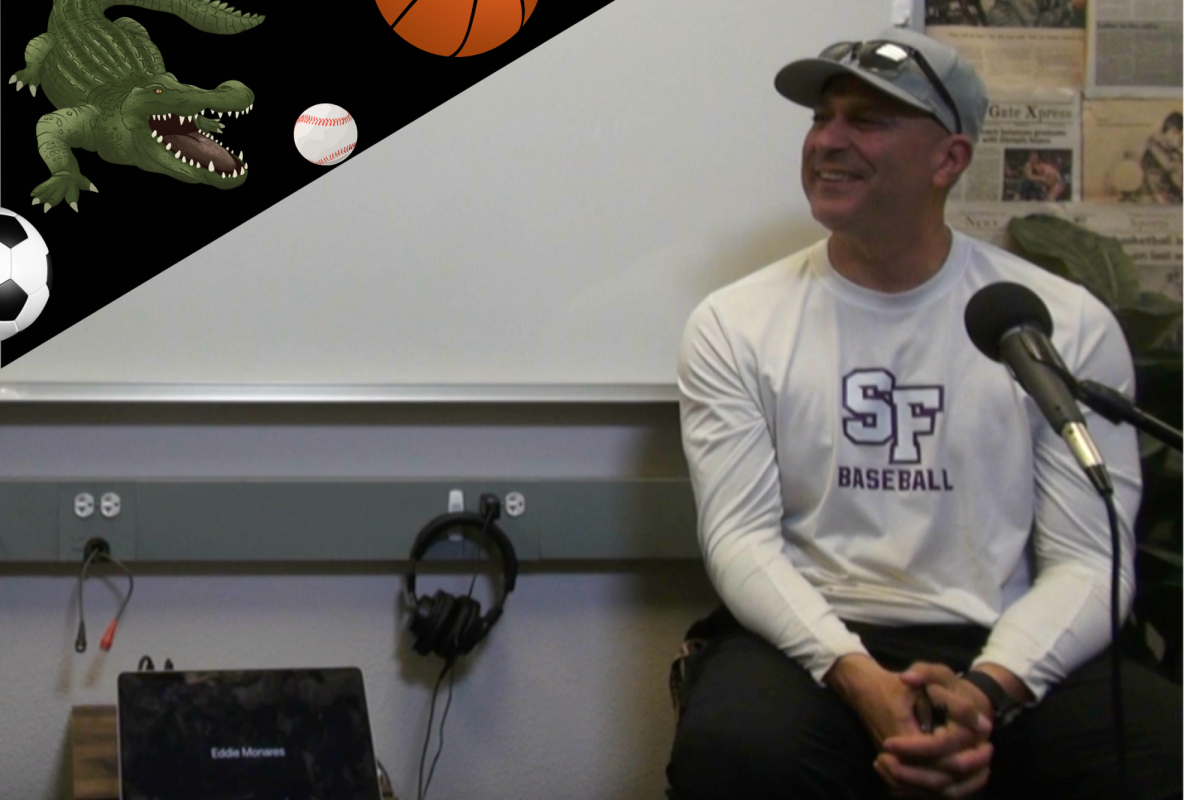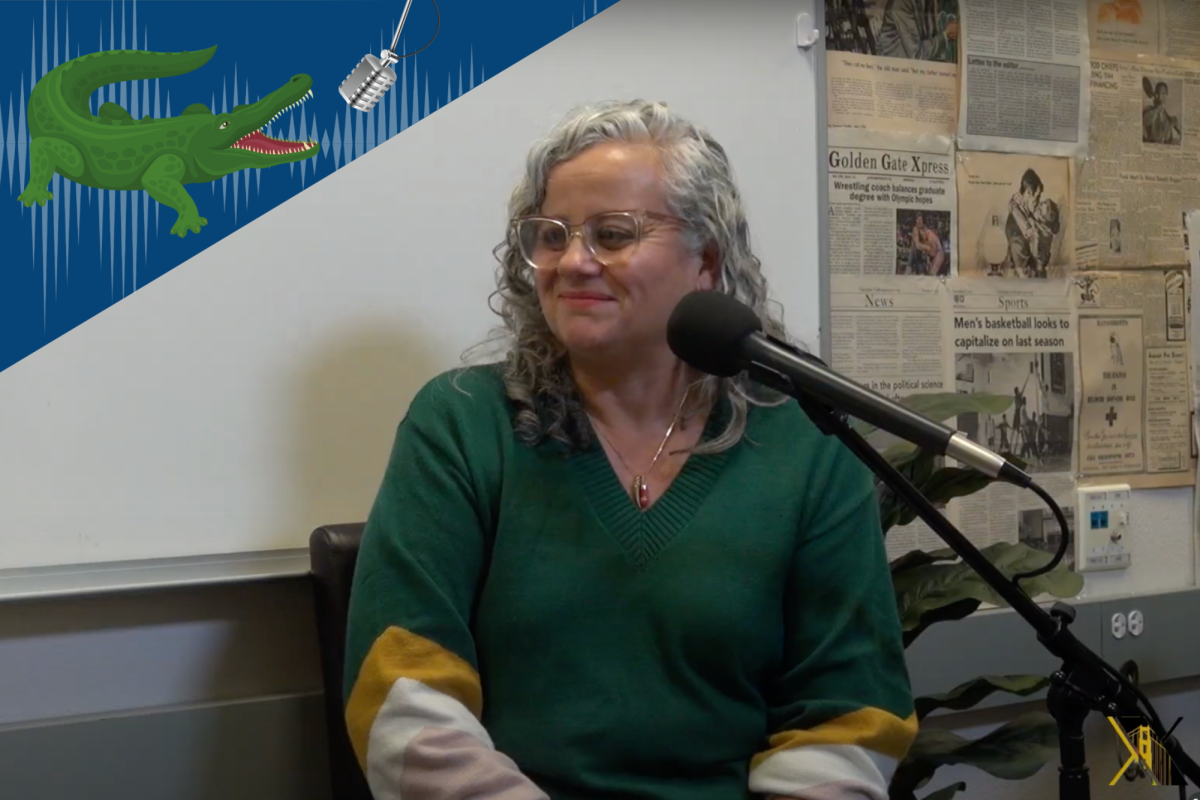Gator Talk is off this week! Welcome to Chiva Pod, a bilingual podcast for the Latinx community in the San Francisco Bay Area! Host, Sebastian takes a different approach for stories during Hispanic Heritage Month. Chiva Pod is launching this series by asking Latino/a Studies professors, what their playlist for this month looks like? Is it a reflection of their identity, their community, or a reflection of lesser known genres they would love to teach about? If you’re catching this podcast on Spotify, tune in to Golden Gate Xpress’ account to see the guest DJ playlist.
Chiva Pod Herencia Playlist
Gator Talk is off this week!
Welcome to Chiva Pod, a bilingual podcast for the Latinx community in the San Francisco Bay Area!
Host, Sebastian takes a different approach for stories during Hispanic Heritage Month. Chiva Pod is launching this series by asking Latino/a Studies professors, what their playlist for this month looks like? Is it a reflection of their identity, their community, or a reflection of lesser known genres they would love to teach about?
If you’re catching this podcast on Spotify, tune in to Golden Gate Xpress’ account to see the guest DJ playlist.
Playlist is here.
Chiva Pod
Bienvenidos a Chiva Pod, I’m your host Sebastian Miño-Bucheli.
So we took a break from producing the next episode. OK … maybe a little long of a break.
But thank you for waiting!
We finally arrived at Hispanic Heritage Month, so feliz independencia a El Salvador, Guatemala, Honduras, Nicaragua, Costa Rica y también a México.
Those celebrations of independence help kick off Hispanic Heritage Month pero, espera … one glaring question I have to answer after the month ends, is the season over?
No no, we’re going to continue on till December!
Okay, estamos listo?
Let’s go on to the news.
Quick Headlines
Broward County, Florida, decided to have a picture of a dancing taco on the days Central Americans celebrated their independence. Let’s go Hispanic Heritage Month!
Protests erupted over the adoption of Bitcoin as legal tender, during El Salvador’s Independence Day. Bitcoin, a type of cryptocurrency, has no real physical monetary value since the currency isn’t tied to a central bank. Stay tuned for an episode of El Salvador and cryptocurrencies.
Main Story
So for Hispanic/Latino/Latinx Month I didn’t want to focus on an episode talking about the history of how the month came to be or even mention the most debated topic in the community: of “Latinx” or “Latino.” Because on this podcast, I’d rather use Latinx.
Anyway …
Like other Latinx journalists, many of us are tired of being responsible to write stories for this month every year once Sept. 15 hits. If you talk to people in la comunidad, they’re most likely going to say they celebrate Hispanic Heritage Month every day — but from Sept. 15 till Oct. 15, they celebrate extra loud. I say that because I actually did a documentary on it and found out the hard way.
For Hispanic Heritage Month, ChivaPod is launching this series by asking Latino/a Studies professors, what their playlist for this month looks like? Is it a reflection of their identity, their community, or a reflection of lesser known genres they would love to teach about?
For this episode, I spoke to Professor Katynka Martinez. She’s the chair of the Latino/a Studies Department at SF State, while also serving as president of the board for Accion Latina, the nonprofit organization that publishes El Tecolote, the bilingual newspaper rooted in the Mission District.
Here’s her breakdown of her playlist.
Professora Katynka Martinez 12:26
My parents are both Mexican, and I grew up the daughter of a single mom who was very much involved with the Chicano movement. So that definitely is part of my formation.
Professora Katynka Martinez 1:31
It was hard to even know when to stop adding songs. I think I had maybe like 15, and then it became 30. And it’s currently 34 songs. And I’ll stop now. And partially because I like the number 34. I’m originally from Los Angeles, and I grew up when Fernando Valenzuela was pitching for the Dodgers, and he is the number 34. And so 34 has a special place in my heart, as a former softball player and Los Angeles resident.
Professora Katynka Martinez 3:17
I grew up at parties. And it’s funny, because now you know, I didn’t include any cumbias, but that’s what would be played with my family parties.
– Bolero starts to play-
That’s what they would dance to. But then in addition to that, there was just like, boleros, that would play on the radio, like Trio Los Los Panchos is a good go-to for mostly musica romantica. And then my mom’s brothers were actually in a band called The Satin Escorts, or something like that. They were just adorable. They’re like in high school, and they wore these fitted suits, and they played rock and roll. Two of them went to Vietnam during the Vietnam War. They both thankfully came back and came back in one piece and found employment in other areas not having to do with music, but they continue playing music. So we had like family bands that would play like rock and roll and would play at carnivals, like church carnivals. So I kind of grew up around music.
-Play Lo Mucho Que te Quiero-
Professora Katynka Martinez 5:57
The songs that stand out to me are like, “Lo Mucho Que te Quiero,” which is by Rene, Rene. And that was, you know, that’s the song like from my mom’s generation, and this, these two guys from that Laredo, Texas who sing in Spanish and English and that song, you know, it’s like what my mom kind of grew up hearing. I put those two songs, and then after, which are like my mom’s songs of her coming of age.
– I Wonder If I Take You Home by Lisa Lisa & Cult Jam plays
And then right after that was, I Wonder if I Take You Home, by Lisa Lisa & Cult Jam, which was like my coming of age, like romance songs, which are totally different. You know, when that when she’s like, “I don’t know, should I go home with you,” you know, which is like the ones of my mom’s generation, which were much more tame. Those are kind of like teen songs. But yeah, Lisa, Lisa and Cult Jam was the first band, was the first concert that I saw without adult supervision, and she’s Puerto Rican and was just like, such a strong presence in the 80s within that kind of, like, you know, freestyle rap, you know, scene and then always just had this really like, powerful like presence, you know? Like, she just seemed like someone you would want to hang out with and would like, want to be like your big sister.
-Play Different Drums
I do Different Drums by Linda Ronstadt and that’s kind of like in keeping with the kind of love and “should I do this?” Should I not but she’s kind of saying like, “No, I’m ready to move on. You’re nice. You’re pretty and everything but I’m not ready for someone to hold me down.” And then La Lupe comes in and is like, you’re just too much drama, right? She’s like, you’re Puro Teatro. Like, I’m leaving you. And yeah, Lupe as you know, Cuban singer, like, again, super powerful presidents on stage vocalist.
I’ve Got Girl in a coma right after that covering Selena Si Una Vez kind of doing like, more like punk slash, rockabilly-ish take.
-play Alice Bag – He’s So Sorry
And then closing it out with Alice Bag. Singing He’s So Sorry. Which harkens back to like the girl group songs of the 60s, instead of “Oh, he’s dangerous, but I love him and he breaks my heart,” but it’s okay or even like literally a song that says, he’s “He hit me and it felt like a kiss,” like that was literally of lyric of these girl group songs. And she’s just like, you know, kind of making fun of that whole idea. The video is like, really great.
Seb: We’re gonna take a quick break –
Break
Support the publication’s work by, by following Golden Gate Xpress @ GGXNews and visiting the student publication website: https://goldengatexpress.org
We’re going to go back to Professora Katynka Martinez’s interview. You can listen to her playlist on Spotify after listening to the episode.
- break ends –
Professora Katynka Martinez 12:30
My grandfather, her father was born in the United States, but was repatriated.
So it was like, that’s a nice word for it, like the deportation program of the early 1930s. Right. So the response to the Great Depression was to lay the blame on Mexicans and like, deport them en masse from the United States. My grandfather was one of the people who got deported during that time, even though he was, you know, a US citizen.
-Corrido de Pedro J Gonzales by Los Madrugadores plays in the background –
And I think that’s partially why I chose Corrido de Pedro J Gonzalez by Los Madrugadores. Because he was a musician and radio host in the early 1930s, that would, you know, play romantic songs, and then also write commercial jingles for, you know, soap or whatever was being sold. But in addition to that he would have on like the Mexican console representatives, or would talk about, you know, the deportations or about,the injustice in the Mexican and Mexican American communities of Los Angeles. And he ended up getting arrested, under false allegations, served years in San Quentin Prison, and then was, you know, found not guilty. He was deemed a wrongful conviction, and he was released, but he was still deported. In his role in terms of like music as a musician, as a radio host, and also in a way like pay honor my, my grandfather, right, and all of the people who have been deported and have really struggled to create lives for, for their families, either in another country, or in terms of, you know, having some family members in the US some family members in their home country.
– 96 Tears by ? and the Mysterians plays in the background –
Professora Katynka Martinez 15:25
Even though like Question mark and the Mysterians didn’t have like this huge career, I just want to locate us as like, yeah, we were doing garage rock, you know and like, Question mark and the Mysterious were in Michigan like no one talks about like, you know Latinos in Michigan and like the mid 1960s right so we’re not always like this new phenomenon and like in states other than like, Florida, California, Texas in New York, right? We have a history throughout this area called the United States. But yeah, it’s a super fun song.
Professora Katynka Martinez 18:23
From like Alice bag I went into Chicano Park Samba which was you know about the park in San Diego that was reclaimed by the the residents of Barrio Logan, a really beautiful song by Chunky
Professor Katynka Martinez
At the same time, these songs were being created. I think I put in there, Juan Gabriel’s No Tengo Dinero.
–No Tengo Dinero by Juan Gabriel plays –
Which is like a classic. And it’s just kind of fascinating to think that that song was on the pop charts at the same time that like these, like, you know, Santana was singing about, like, you know, naming a song after a Haitian Revolutionary, you know, like, it’s all just like kind of mind blowing to think in that way. And then I also put in like, kind of to be a little bit anachronistic I put in like Aloe Blacc I Need One Dollar you know, kind of building off of like one guy, but he had his whole like, oh No tengo dinero, but you know, it’s okay, you know?
– La Jaula del Oro by Los Tigres del Norte plays –
Placing that next to La Jaula del Oro by Los Tigres del Norte, where a father is basically saying, like, I’m in the United States, but I’m living in fear of being deportation deep being deported. So it’s like, I’m in this golden cage, and my, my children can’t even talk to me or like, they don’t, they don’t know me, they don’t know the language. But and, and so kind of just recognizing that, like, the multiple experiences, right, like, so, one person might be, like, immersed in, like the Chicano movement. And then at the same time, you’ve got someone listening to find Juan Gabriel on the radio, and just like really moved by, like his presence, and that’s just equally as powerful. And then there is like, you know, the immigrant has, like, I don’t know why my kids are out in the streets and growing their hair longer, you know, or, like, now, like, doing whatever they’re doing now, right?
And then, and then I wanted to bring in Los Lobos, and all of that and, and the song I chose from them was Saint Behind the Glass. And it’s just such a beautiful song, I think. And that whole album Kiko is Oh, no, I think it’s kind of like a masterpiece, just in terms of music in general. And, the songwriter Louis Perez as he, you know, he describes that song is just kind of being informed by like, what he saw in his home in his parents home.
They definitely paint a picture. And that picture is of like, you know, second generation, you know, observing life. So, yeah, so that’s kind of, like something I was trying to capture with the, the combination of,, of songs of that, of that in the late 1970s and 60s,
-Killing in the Name by Rage Against the Machine plays in the background –
Professora Katynka Martinez 23:23
I just added today, like, probably a few minutes before joining this interview, was Killing in the Name by Rage Against the Machine. Right, just to just kind of bring it back to my college time. And then, you know, also Ana Tijoux, Anti- Patriarca. And that being part of like, the kind of, like protest section of the playlist as well.
-Star Spangled Banner by Jose Feliciano plays in the background –
Professora Katynka Martinez 28:56
what does it mean to include, like, the Star Spangled Banner on this playlist, but I think, you know, putting it alongside the retro that we didn’t pass, you know, I think I hope it’s clear that I’m not in any way like, you know, holding up the United States as exceptional blameless entity here. But, you know, he, yeah, he performed the Star Spangled Banner at, at a World Series, I believe. 1968. And, I mean, he’s saying the lyrics that are the lyrics of the Star Spangled Banner, but in a very bluesy way and very intentionally, you know, wanted to I think slow things down and just make people reflect on what was going on, you know. A lot of people have redone the Star Spangled Banner in many different ways. We Think about Jimi Hendrix. I think Jose Feliciano, I’m pretty sure his performance predated Jimi Hendrix on, you know, the, on his guitar. But yeah, like people were really working these kinds of, you know, kind of markers of, you know, patriotism.
Professora Katynka Martinez 31:51
If a musician can be sought out and captured and tortured and killed, right. His guitar, and his voice was, was a weapon, you know.
-Derecho de Vivir en Paz by Victor Jara plays –
Professora Katynka Martinez
And, you know, the power also of that song is that it’s not, he’s not only talking about his home country, I mean, he’s talking about like, Vietnam, right? My mom, like, had a cassette tape of Victor Jara. And would play that, you know, that cassette, and, you know, she’s never been to Chile. But she knew what, what, you know, what his message was, and it really resonated with her
Professora Katynka Martinez 33:31
We just, you know, acknowledge the, you know, the 20th anniversary of 9/11 in this country, but, you know, no real recognition of, like, the 9/11 of Chile, right there, the coup that happened on that day. I don’t know, I feel like, you know, this country, as tragic as, you know, the 2001 9/11 not everything revolves around us. And it really reflects a lack of understanding of history, right, that’s the only kind of reference point for that date.
Professora Katynka Martinez 36:25
Between Anna Tijoux and Malo, I have Helado Negro’s Young Latin, and I’m proud. Because that was the last concert I went to before. You know, the COVID shut down. And he’s just a beautiful person. Like he’s, he’s just an amazing musician, and works with amazing musicians. But he is young Latin and proud it’s really simple, Coming back to, to Milo. Yeah, I guess it’s kinda like a full circle. And I guess it’s a way of saying goodbye, I don’t know.





